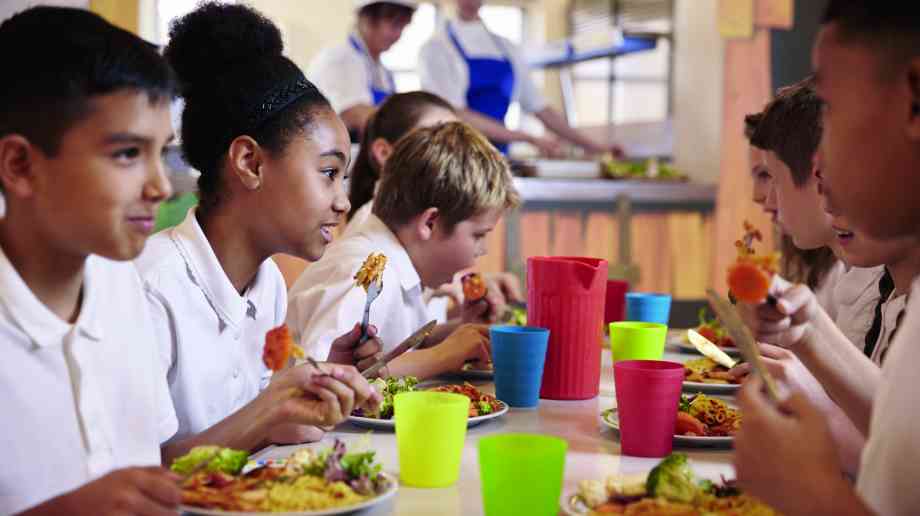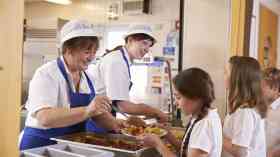
Connecting children with food
With four in 10 children leaving primary school overweight or obese, now more than ever, schools need to place good food at the centre of pupil’s plates, curriculum and wider learning. The Soil Association’s Food for Life programme works proactively to reconnect children with where food comes from, making healthy, tasty and sustainable meals the norm for all to enjoy
The state of children’s food in schools has reached a crucial tipping point and by 2024, four in 10 children leaving primary school will be overweight or obese.
Now more than ever, schools need to place good food at the centre of pupil’s plates, curriculum and wider learning.
Schools already work hard to manage overloaded schedules and ever-present budget restrictions. However, schools need not go it alone in their continued efforts to improve food culture amongst pupils, staff and parents.
The Soil Association’s Food for Life programme works proactively to reconnect children with where food comes from, making healthy, tasty and sustainable meals the norm for all to enjoy.
From teaching children how food is grown, to cooking up delicious meals whilst championing the importance of well-sourced ingredients, working with Food for Life gets pupils digging into healthier food that will feed their mind, body and community connections.
The initiative is widely commissioned by public health teams and taken up by schools across the country – over 1,100 School Awards have been achieved and over 5,000 schools have enrolled in the network.
Results highlight the clear health and economic benefits of the Food for Life award. Independent evaluation has shown that if all primary schools were Food for Life schools, one million more children would eat five or more portions of fruit and vegetables per day.
What is more, research by the New Economics Foundation demonstrated £3 in social return for every £1 invested in Food for Life Served Here Menus – the results extend far beyond the lunch hour. In fact, FFL primary schools are more than twice as likely to achieve an Ofsted rating of ‘outstanding’across 10 criteria for inspection compared to the period before programme enrolment.
Get Together
One of the most rewarding ways of embodying the Food for Life spirit is through organising a Get Together event.
Food for Life Get Togethers bring people of different generations together to share, grow or cook food. It’s an excellent chance for children, teenagers and older people to bond, and to discover that people of all ages and backgrounds aren’t really all that different. The positive effects of hosting a Get Together will reach beyond the school gates and curriculum, and with loneliness on the increase, a Get Together is a great way to connect pupils with the wider community. In fact, it’s been reported that over nine million people across the UK often or always feel lonely.
Hollywood Primary School and Anita Stone Court in Birmingham teamed up to run their first Get Together with incredible results. One little girl, who had spent her first year at school refusing to speak, caused her teachers to well up when she sang in front of everyone; an overwhelming achievement. Following the same event, a care home resident with dementia remembered the child they were partnered with after the sessions and asked when they’d be coming again. It’s clear that when different generations come together over food, amazing things happen. A 2017 investigation found that intergenerational contact successfully reduces ageism towards older adults.
Teachers are huge fans of the scheme. A Year Five teacher in Bristol said: “I love having all the parents and grandparents in. It reminds the children that we’re all part of a wider community than the school building itself. It creates a family dining experience and reinvigorates the idea of healthy eating and eating together.”
Get inspired
If you’re feeling inspired, here are some ideas for Get Togethers to get you started.
On 25 February it is pancake day. Homemade pancakes are delicious, wholesome and fresh. Get the kids and older people whisking up the batter, load them up with fresh fruit or some healthy savoury fillings and serve warm.
On 8 March, it is International Woman’s Day. Can you think of an amazing and inspiring woman, foodie or otherwise? Why not bring your community together and share stories of the women who have inspired you? People of all genders welcome, of course.
From 27 April to 1 May, it is Grandparent Gardening Week, and it is not just for grandparents; people of all ages can benefit from spending time outdoors and in nature with others. Invite aunties, uncles, community leaders or local legends along to get together with younger people from nursery school children to youth groups.
FFL is a big supporter of Eden Project Communities’ The Big Lunch scheme on 6-7 June. Get the bunting up and the picnic blankets out and invite the community in for a sarnie and some home baked treats prepared by your pupils.
The United Nations World Food Day on 16 October is all about making healthy and sustainable diets affordable and accessible to everyone. Why not raise awareness with a harvest festival breakfast?
Improving food education
Of course, you can host a Get Together any time of year – it doesn’t need to be on one of the days we’ve suggested.
From farm visits to flipping pancakes, improving food education and school meals can be fun and kick-start more than you might initially realise. Make 2020 the year your school steps up to the plate, making food, health and social interactions a top priority. The results will be far-reaching and beneficial to your pupils, school finances and the wider community.
Find out more and register at www.foodforlife.org.uk/get-togethers where you can make the most of our free resources.
Further Information:
Latest News
31/10/2025 - 10:12
A growing number of UK children are now eligible for Free School Meals (FSM), yet most still aren’t taking advantage of them on a daily basis, new research reveals.
30/10/2025 - 01:28
In the wake of the Raac crisis, the DfE spent £5 million on research into the condition of school buildings, which is due to conclude in spring 2026.
30/10/2025 - 01:09
Malmesbury Primary School in Wiltshire has submitted plans for a major expansion, funded by entrepreneur James Dyson.
30/10/2025 - 00:55
Monday's Every Pair Tells a Story campaign to protest to highlight the national crisis in SEND provision.
29/10/2025 - 09:19
Estimated data from the Department for Education reveals that 470,000 pupils under 16s use local authority funded transport to get to school.







